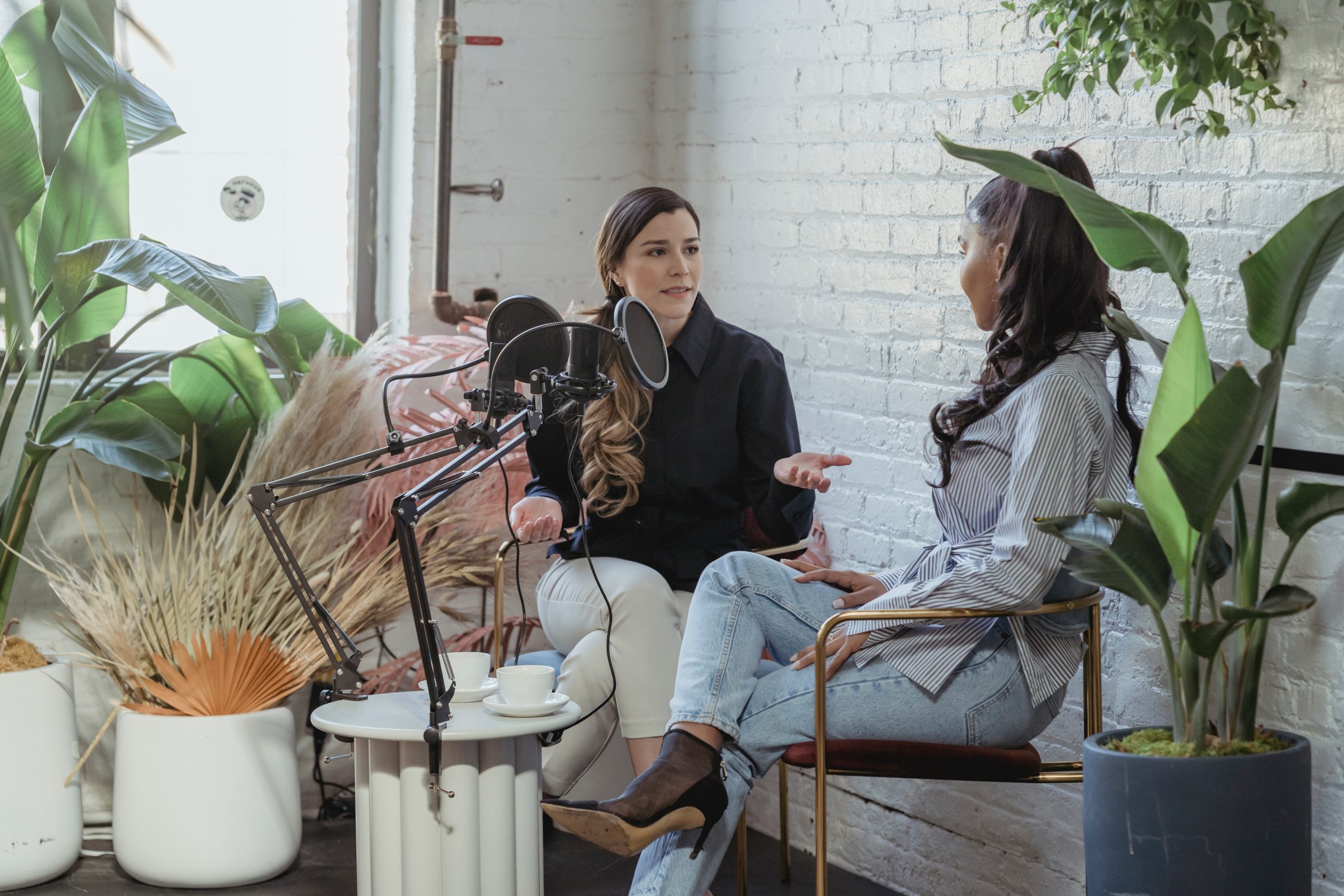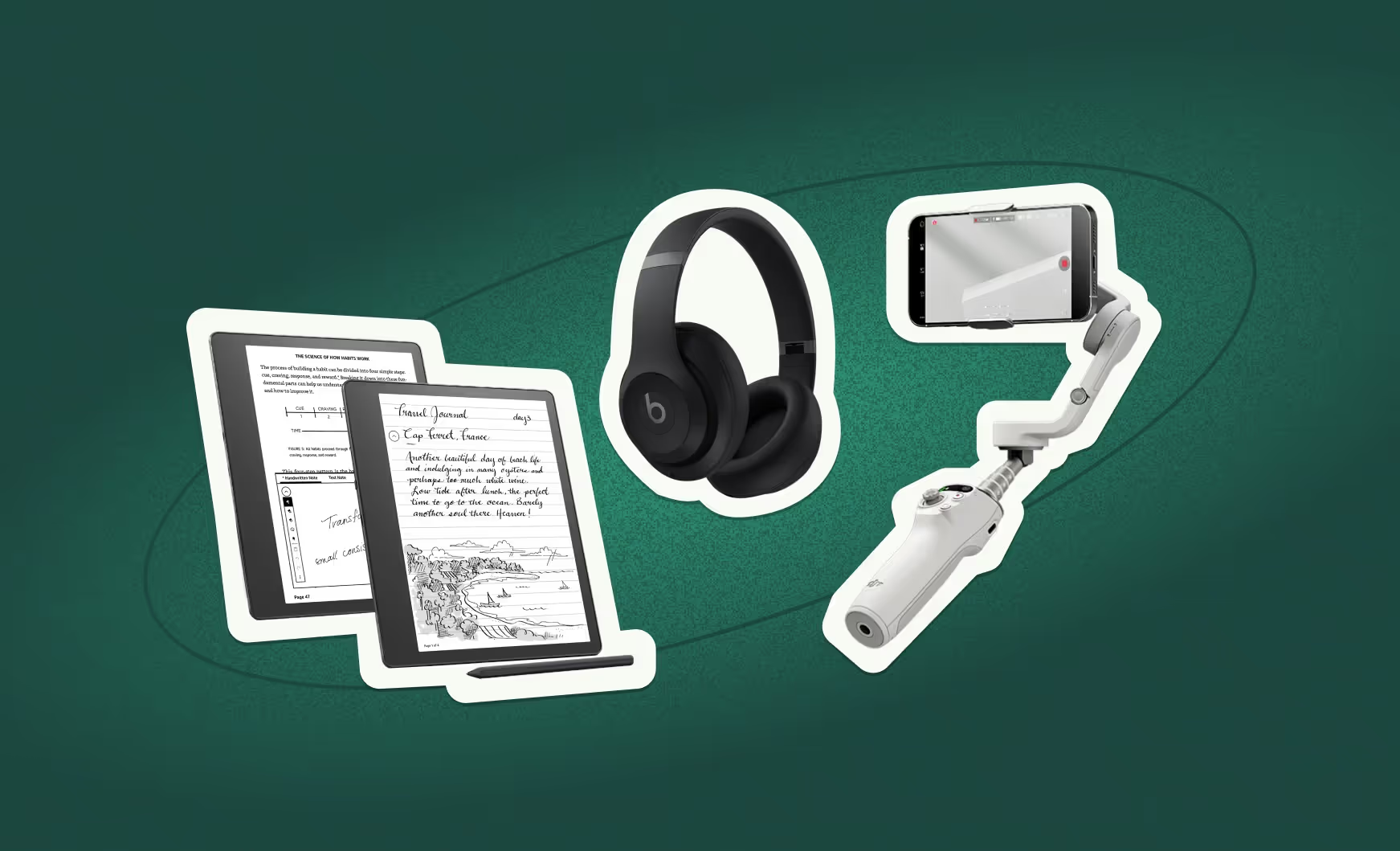With Spotify shelling out $60 million and $200 million deals on podcast shows, it’s no wonder that more and more content creators are curious to learn how to start a podcast. The demand for audio content continues to grow, with even 45% of the US population listening to audio content daily.
Starting a podcast can be a fun and exciting way to grow your business and find a new audience. However, if you’ve never had experience with audio content, it might appear like a challenging task. If you’re looking to start podcasting but feel overwhelmed and unsure where to start, we have you covered! We created this in-depth guide on starting a podcast that will help you go from podcast newbie to podcast pro in no time.
But before we jump to the step-by-step guide on how to start a podcast, let’s cover some of the basics.
What is a podcast?
A podcast is a digital audio show available for people to access, subscribe and download on the internet, most often for free. It is often episodic, with new episodes coming out multiple times per week or month. However, some podcasts are seasonal, with a set number of episodes coming out over a certain period, ex: three months out of the year.
What are the benefits of starting a podcast?
There are lots of benefits to starting a podcast, whether you are doing it as a wash to make some side cash, to boost your brand, or for your hobby interests.
Build brand authority and credibility
For example, if you make a podcast related to your brand or e-commerce business, you can build up your brand’s authority and credibility in its niche. Talking about complex topics or current topics of interest in your industry can show your audience that you know what you’re talking about, making them more likely to give your brand a try if you are new to a particular arena. This can be great if your industry has a lot of technical information or customers have common questions and concerns.
Reach new audience members
Similarly, podcasting gives you the opportunity to reach new audience members compared to other marketing tactics. Podcast listeners may become interested in your brand, even if they haven’t seen other advertisements, like social media ads or PPC ads, before. High-quality podcast content is also more effective at converting “on the fence” customers or prospects.
Increase audience loyalty
Those customers you’ve already acquired can also benefit from podcast episodes. That’s because the right podcast content can increase audience loyalty. Your current target audience members may listen to your podcast episodes, growing more confident and secure about buying from your brand and trusting you with their business. This is particularly beneficial if your brand is a B2B or business-to-business enterprise.
Make side income
But you can also benefit from starting a podcast for other reasons, like making side income. If your business is popular enough, you can potentially make a lot of money from individual episodes or complete series – some of the most successful podcasters have entire careers based on their podcast shows, so they don’t have to do anything else.
Note, of course, that this is far from the norm! You shouldn’t start a podcast expecting to monetize it right off the bat or to make a substantial profit anytime in the near future. Still, with enough creativity and innovation, you could build up a consistent podcast audience and make significant cash from it, especially if your podcast topics are interesting enough.
Do you need an audience to start a podcast?
You don’t need an audience to start a podcast. Many of the most successful podcasts began with audience counts of zero. But if you don’t have an audience to share your episodes with, you’ll need to build your brand and target audience through a concentrated and comprehensive marketing plan.
Like any other digital product, your podcast needs to be marketed to potential listeners. Once you have a collection of listeners outside your friends and family, you’ll be able to share your podcasts with your complete target audience, driving traffic to your website, e-commerce store, and elsewhere.
To that end:
- Determine who your podcast’s target audience is. Practically every podcast topic already has an existing audience; you need to determine whether that audience is the same as your personal brand, business audience, etc.
- Once you know the people most likely to listen to podcasts about your brand, you can promote your podcast using marketing materials such as online ads or through your blog on your website. Social media is also a great way to promote podcast episodes and bring new listeners to your show.
- As you get new listeners, encourage them to bring other listeners into the fold. Continue to advertise – building an audience takes at least several weeks, if not several months, to get to a successful number of listeners.
Of course, your podcast hosting style and topics will also influence whether initial listeners come back for future shows. The more high-quality you can make your podcast, the better.

How to create a podcast with no audience: step-by-step guide
Now that you know why you should start a podcast for your brand or personal marketing objectives, let’s take a look at how to do so step-by-step. Successful podcasters use these steps, too, so remember to keep these steps in mind as you ideate and develop your podcast strategy.
Brainstorm podcast topics and ideas
You can’t have podcast episodes without knowing what you’ll talk about beforehand. That’s key to being a successful host and inviting interesting guests to your show. With that in mind, you need to brainstorm podcast topics and ideas.
Naturally, this is easiest if you try to come up with topics related to your brand, industry, or niche. Many podcasters create cool episode topics by brainstorming episode titles, like:
- What’s the best way to lose weight?
- How to make money online
- Job ideas if you’re looking for a career
- And so on
Depending on your brand’s focus, you could potentially come up with dozens of different episode titles and ideas. The sky’s the limit, so get creative!
Choose the right podcasting equipment for you
Of course, your podcast and its quality will also be impacted by the equipment you choose to use. Indeed, less-than-stellar podcast equipment can make your show painful or uninspiring to listen to, while high-quality equipment will have the reverse, positive effect.
You don’t have to break the bank to get good quality equipment, fortunately. For example:
- Choose a good dynamic or condenser microphone. Dynamic microphones are usually ideal for podcasting, as they have less sensitivity to ambient noise in your environment
- Take a good pair of headsets so you can hear yourself and ensure sound quality is good during any given episode
- Be sure to use podcasting software and a full PC setup so you always have access to key information about the podcast, mix, etc.
Having good equipment will set your podcast up for success right from the get-go, ensuring that your audience has a stellar time and that each episode is enjoyable to listen to.
Create engaging podcast content
Arguably the most important step to starting a podcast with no audience is creating engaging content. Many podcasters have a few different types of content they like to create, such as:
- Guest interview episodes, where the podcast host invites and interviews an interesting guest related to the brand niche, industry, or episode topic
- Solo episodes, where the podcaster reads listener comments or answers questions. These are great options for filler episodes
- Discussion episodes, where the podcaster takes comments or speaks to listeners about subjects. This is similar to a radio show
Promote your podcast to grow your audience
You’ll also need to promote your podcast heavily to grow your audience over time. Podcast promotion can take a long time to yield results, but there are a few different ways in which to do it successfully.
For example, you can post on your social media page or other marketing avenues. Announce your new podcast show and the dates and times of the first episodes. Having consistent broadcast times for all subsequent episodes is also ideal, as it allows listeners to predict when your shows will go live or be uploaded.
Don’t forget to market by networking with others in your niche. Guest blog posts can be effective, as can other social media campaigns. Feel free to make a website or landing page for the new podcast and its episodes, as well – in some cases, you can include an email sign-up form to acquire new listeners who are already part of your brand’s loyalty group or social media followers.
Measure & optimize
Successful podcast hosting involves a lot of measurement and optimization. Specifically, you need to measure:
- How many listeners your podcast episodes get
- Whether your listeners go through complete episodes or if they fall off at some stage
- If listeners do stop listening to the episodes, measure the points where you experience the most drop-off
- And so on
By measuring all of these data points, you’ll have a better idea of what kind of podcast content you should create in the future and what content your listeners are looking for. Of course, surveys, comments, and other volunteer information from your podcast audience are also invaluable.
Remember, podcasting is a marketing tool and a product. Gathering feedback about that product is just as vital here as it is elsewhere.
Monetize your podcast
Monetizing your podcast should come after you build up at least a modest audience. Once that happens, there are a few different ways in which you can do that:
- For example, you can run ads and use your podcast as an anchoring platform. You’ll read off advertisements and coupon codes or similar discounts in the middle of your show
- Sponsorship deals are also ways to monetize your podcast episodes. You can work directly with different brands to place ads before, during, or after the show
- Or you can take advantage of paid deals. If your podcast gets popular enough, you may get deals with big platforms like Spotify, in which case the platform itself will pay you to produce podcast content

Podcast ideas for beginners
After you’ve identified your general area of interest, narrow down what your podcast will cover. Consider these ideas as you start brainstorming episodes:
Share your story
Allow listeners an inside look at how you got to where you are today. Episodes could spotlight different lessons learned along the way, offering suggestions and perhaps what you would do differently. Even if they don’t all have lessons attached to them, personal stories build trust and connection. You might also consider humorous or entertaining stories.
Interview others
Interviews are a great way to collaborate, bridge communities, and build connections. Reach out to others in your industry or field of interest. In the process, you might even find opportunities to be a guest on other podcasts to expand your reach.
Review relevant media
Review, recap, or interpret TV shows, movies, books, poetry, art, even music videos (hello, Easter eggs)—anything in pop culture, really, that would be of interest to your audience. You can even invite them to engage in the dialogue!
Present new research
Stay on the pulse of your industry by sharing emerging research and breaking it down for your listeners. Even if you’re not an expert in your field, this will allow you to build trust with listeners as an authority who is in the know of important information.
Repurpose old content
Turn your old content into something fresh on another platform. For instance, if you’ve written relevant blog posts to your industry, discuss them on various episodes of your podcast (you can also include links to original content in episode descriptions). This is something author Gabby Bernstein does very well. Gabby often turns to her previous content, including past lectures and events, as well as passages from her bestselling books, for Dear Gabby podcast episodes.
Offer advice
Whether it’s meditation, fitness tips, art-making, or even cooking, offer listeners a step-by-step guide to topics in your field of expertise. In addition to how-to exercises, general advice, tips, and listicles can be of service to listeners. Allow them to submit what they like more information on to help plan your episode content accordingly. Some examples of podcasts that do this well are We Can Do Hard Things with Glennon Doyle and Dear Sugars, hosted by Cheryl Strayed and Steve Almond.
Tell a story
Whether it’s a True Crime mystery, fictional whodunit, or some other genre, narratives can be fun to experiment with, as the plot can build and give your listeners incentives to tune back in.

FAQs
How much does it cost to create podcasts?
How much it costs to create and produce a podcast varies greatly amongst creators and their choices. It can be anywhere from $0 to $10,000. A plethora of free tools available for free allows you to start a podcast with no upfront cost.
And if you have a budget and want to invest in starting a podcast, you can opt for a studio or make one in your own home where you have sound-isolated walls and professional equipment that creates studio-level quality audio.
Can you get paid for podcasts?
Yes. There are different ways podcasters can make money:
- Running ads: Anchor is a platform that has the option for podcasters to enable ads on their podcast for which they’ll get paid.
- Sponsorships: podcasters can work directly with brands to place ads for their products and services in their episodes.
- Paid deals: on rare occasions, popular podcasts (most often celebrities) get deals with Spotify and other podcasting platforms directly to host their podcasts exclusively on the platform.
If you have a business yourself and sell products and/or services, you can also make money with your podcast by using it as a marketing tool to promote your products.
Join more than 150,000 creators who use Teachable to make a real impact and earn a real income.








